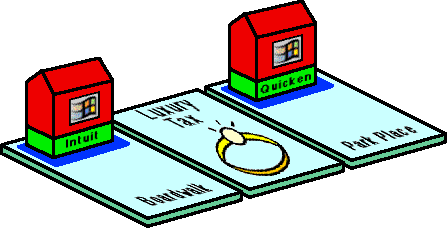

In regard to the Microsoft-Intuit merger, Gary Reback, Palo Alto lawyer and author of the White Paper, states, "My greatest fear is that an inferior technology could be locked in and bring progress to a halt."
Intuit chairman Scott Cook wrote in a September 1994 memo, "Our combination gives one clear option -- eliminating a bloody market share war, and speeding adoption."

In October of 1994, Microsoft agreed to purchase Intuit, the software company which owns Quicken, the world's most popular personal finance manager (PFM). For $2.3 billion, Microsoft would have control over Quicken's 70 percent of the emerging PFM market. Early in 1995, the United States Department of Justice filed an anti-trust complaint blocking the acquisition, claiming it would give Microsoft a virtual monopoly on the US PFM market and give it a "cornerstone asset" with which to control on-line home financial services. Soon after the suit, in a move uncharacteristic of the company's relentless drive forward, Microsoft pulled out of the deal. Bill Gates explained the surrender as follows: "Progress toward realizing our goals could not wait until the government's law suit was resolved." The DOJ successfully killed the merger, but was the killing justified and was the killing fair?
The Department of Justice's case is compelling. Progress occurs through competition, and a Microsoft control of Quicken would have strangled competition. The two largest PFM's are Microsoft Money and Intuit's Quicken. Microsoft's attempted purchase reveals an unwillingness on the part of the software goliath to improve its own software in the face of tough competition. A 70% market share, however large, can be swayed with the force of a clearly superior product. Microsoft's coffers, bulging into the billions, can be used to make that superior product; in the end, the market will lean towards the better software and all consumers will benefit.
The attempted Intuit acquisition can be likened to a child playing a game of chess. Microsoft is playing many games simultaneously, and each game represents a different software market -- operating systems, word processing, data bases, PFM's, etc. Microsoft is dominating every game, every game except one. While the software giant toys in the other games with a majority of the pieces, the company finds itself struggling in the PFM game; its moves are no match for Intuit's quick mind. So what does Microsoft do? It could work on its own playing until it matched Intuit, but that would take too long. Like a spoiled child, it instead offers the opponent a bribe to reverse the board. After the deal is finished, Microsoft captures the pieces that were once its own and claims victory over the foe that was paid not to play.
Because the deal was derailed, because Microsoft was forced to play without buying victory, competition has flourished. Microsoft is updating its Microsoft Money and banks, credit card companies, and on-line services are all expected to move quickly into the world of electronic finance management.
Proponents of Microsoft point out that Intuit already has a PMF market share of 70%. If that is not a monopoly worth anti-trust action, what difference does it make who owns the software? A large difference, missed by such questions, is Microsoft's unique capacity to widely disseminate software. If the acquisition occurred, Microsoft could have integrated Quicken into its Windows '95. Such a move would have pushed the software into almost every home, forcing a standard in the PMF market and suffocating any business hoping to compete.
Back to Danger of Corporate Monopolies Main Page